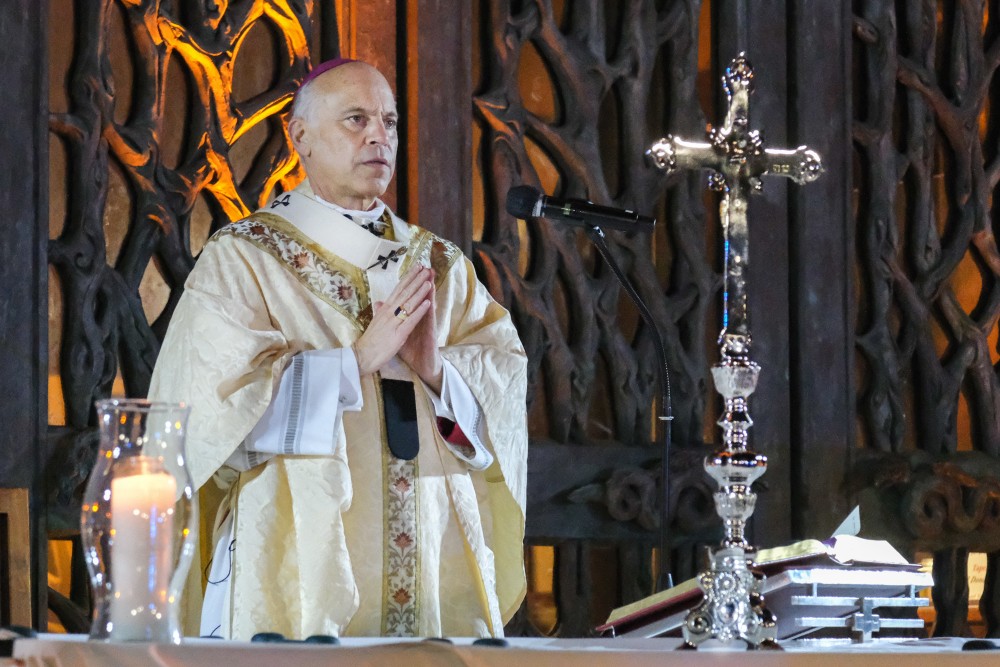
PROSPECT HEIGHTS — Ahead of polls opening next month, Archbishop Salvatore Cordileone of San Francisco is asking the local faithful, “Why would anyone want to stigmatize a primary health care facility and a pregnancy resource center that gives pregnant women support for having their babies?”
The question pertains to a San Francisco ballot measure, Proposition O, that Archbishop Cordileone argues would do just that, and for that reason, is urging the faithful to reject it. In part, the measure would require signs placed outside of pregnancy resource centers that do not offer abortions, or refer for abortions.
Archbishop Cordileone, in a recent video message, highlighted the double standard of the proposal.
“Why doesn’t Proposition O require the city to install signage outside facilities that do abortions to direct women to places where they will be supported in giving birth?” Archbishop Cordileone asked. “Why doesn’t it require such facilities to post the same signage announcing that they do not provide the full range of reproductive rights because they only provide abortion and contraception and do not offer life-affirming alternatives? Do the authors truly believe in choice?”
Proposition O, or the San Francisco Reproductive Freedom Act, essentially reiterates many of the abortion laws that already exist in California to bring them to a local level, while adding the piece about the signage and a website that will be maintained by the Department of Public Health (DPH).
The website would list pregnancy service centers in the city that provide or offer referrals for abortions or emergency contraception, as well as “limited service pregnancy centers,” which are those that do not. The latter will also have the signs installed outside of the facility.
“DPH may install signage outside of limited services pregnancy centers in the City to inform the public that those facilities do not provide or offer referrals for abortions or emergency contraception, and to provide information about where those services may be available,” the measure’s text states. “DPH may prioritize installing such signage in geographic areas of the City where there is a greater need for abortion or emergency contraception services.”
According to the legal text, DPH would provide so-called limited service pregnancy centers with at least 30 days written notice before installing the signage. The facility or owner of the premises can file a petition with the Director of Public Health to prevent the signage, however, the director’s decision will be final.
In a proponent’s statement for the measure, San Francisco Mayor London Breed said that it “ensures that everyone in our city has the autonomy to make decisions about their reproductive health.”
“Passing Prop O is not just about preserving rights; it’s about protecting lives,” Breed said. “Comprehensive reproductive care leads to healthier families and communities. Prop O ensures that women and all people who can become pregnant are not forced into dangerous or untenable situations.”
Conversely, Archbishop Cordileone argues in his Oct. 3 video message if it becomes law, Proposition O would endanger the employees, volunteers, patients, and clients of life-affirming state-licensed health clinics “because by singling out facilities that refuse to perform abortions, it potentially opens them up to abusive behavior by opponents.”
“This flies in the face of the measure’s language that states ‘People in San Francisco should always be able to access reproductive health care services free from coercion, threat, violence, or fear’,” Archbishop Cordileone said, also noting that having babies is something that falls under reproductive health care.
“Both organizations targeted by Proposition O help women, children, and the entire family without regard to ability to pay. Both are licensed medical facilities,” Archbishop Cordileone said. “If we want to create a civil society we must affirm across-the-board support for human life. That means alternatives to abortion and euthanasia, repealing the death penalty, and working to end all racial and ethnic discrimination.”
“I urge you to vote no on Proposition O,” he concluded.
